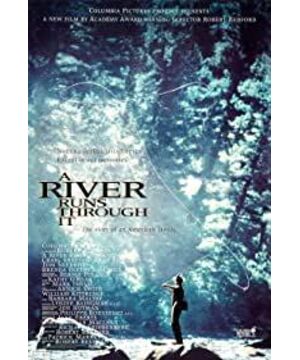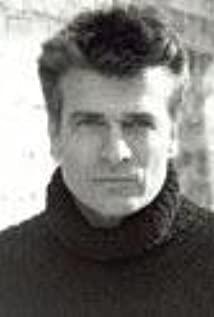The whole film is as beautiful as a flowing landscape painting of mountains and rivers. The beauty pursued by "Love in the River" can already make the audience completely forget that they are watching a drama. Although the plot is a little flimsy, the audience only wants to indulge in the beauty created by the photographer. Among the many Hollywood blockbusters with ups and downs and constant thrills, it is like a clear spring to wash people's hearts.
"River Love" is a 1992 film directed by the famous actor Robert Redford, based on the autobiographical novel of Norman McCawley, a professor of English literature at the University of Chicago. Because the novel does not have a vigorous plot and dramatic conflict, making the adaptation of the film is very difficult. Robert Redford and screenwriter Richard Freidenberg divert the film's focus from plot to depiction of landscapes and the river's symbolic meaning of life. The film received unanimous praise after its release, and was called one of the most shocking and perfect films of the year by the industry. The film was nominated for Oscars for Best Cinematography, Best Screenplay and Best Music of the year, and unsurprisingly ended up winning Best Cinematography.
The film tells the story of an ordinary American family in the early twentieth century. Norman and Paul grew up living with their parents in the undeveloped Big Black River in Montana, where their father, McLean Sr., was a strict minister. The two brothers have strong feelings but different personalities. The eldest son, Norman, is steady and restrained; the younger son, Paul, is lively and unruly by nature. However, when the father and son came to the Big Black River and waved the long fishing line, at this time, fishing became their most tacit communication.
Norman received his father's language education since he was a child, and he wrote good articles. He also inherited his father's true fly-fishing skills and became a university professor; while Paul changed his father's fly-fishing skills and created his own school. industry, and finally died in a gambling debt dispute.
Fly fishing is a main thread throughout the film. Fly fishing is a fishing method in which feathers and colored lines are attached to the hook, disguised as flies, to lure fish. The old Maclean experienced the law of life in nature created by God by teaching his son the technique of fly fishing. Fly fishing is not only a skill expressed in "four-beat rhythm in the range of ten o'clock to two o'clock", but also a family activity for Maclean's father and son to communicate emotionally and convey the value of experience.
The director often shows Da He in front of the audience in various beautiful gestures, as if the audience is listening to Da He telling the story of life, not the narration in the film. This poetic film talks about the life beliefs and principles of the two brothers, as well as the communication and limitations of family relationships.
Paul never sticks to the laws of nature. When he took his Indian girlfriend into a pub where Indians were never allowed to enter, his eyes were so burning when he looked at those who regarded him as an alien. It seemed to devour the sophistication and rules that he dismissed. Paul seems to be born to contend with the laws of nature, and he is free from all laws of nature, standing like a work of art over the river. As Norman said: "Paul is different, Paul's strength comes from somewhere in the body, he believes that he is stronger than anyone."
Under the same faith and earnest teaching from their father, older brother Norman and younger brother Paul have grown up in dealing with all things since they were children, but they have grown up with a distinction between what is right and what is beautiful. The scene in which the brothers ran away from home in the middle of the night and went to the rapids with their companions was filmed as calmly as the main style, however, there were some twists and turns. When the brothers rowed the boat to the fast-flowing river, their hearts were filled with the same curiosity and fearlessness of life, but when their boat rushed to an extremely dangerous waterfall, the camera turned to the one caught by the river. The small boat that was overturned and covered on the reef disappeared, and the two brothers disappeared, and the companions who were watching saw the scene and rushed to the boat in the river. The false alarm companions started playing. Paul was so excited to have conquered the waterfall that he nearly lost his brother and his own life, but he cheered for being freed from the laws of nature and proud that he had won the game of the brave. At this moment, Norman was sitting quietly on the mound by the river, showing an anxious look, as if he had lingering fears about the torrent just now. He seems to have realized the preciousness of life at this moment. Life is not art, and that moment will not last long. After returning home, the brothers could not help being reprimanded by their father. Norman deeply regrets and upsets his parents that his actions have caused extreme anxiety. And Paul's reckless and brave behavior in front of his brother was rumored to be a good talk at school. At this point, Norman's regret and unease turned into anger, and they fought... The conflict between their personalities finally broke out, but it was also the last time. From then on, they knew that they were different from each other, but they both retained an understanding and trust in each other. The camera turns to the harmonious fly fishing scene of the father and son. Fly fishing is the exchange of their minds.
Returning from Norman University during the summer, he finds Paul, who has become a newspaper reporter. Paul invites Norman to go fishing in the Big Black River. There is a warm picture of fishing in the film. Norman swung the rod according to the fly fishing method taught by his father, while Paul changed the method of fly fishing and created his own shadow fishing method, in which the line draws a circular trajectory around the angler.
The moment the fishing line is thrown, it is an extremely beautiful scenery. As my father said, this is art, the art of life. It’s just that each person’s trajectory after throwing is different. Norman learned from his father, and he melted into his own life, a peaceful life, but Paul was different. He changed his father’s rhythm, Having created his own way, in Norman's eyes, the younger brother became a true artist.
On the last time the McLeans were fishing together, Paul was so perfect at fly fishing that he earned his father the title of genius. However, when the drive for self-achievement loses its direction in life, it can easily become the drive for self-destruction; under the entanglement of gambling and alcoholism, Paul finished his life at a very young age, leaving it to his family Infinite grief and regret. And Paul's death is described as the river in the film, so peaceful.
The whole film is immersed in the magnificent scenery of mountains and rivers. The characters move slowly in the mountains and rivers, allowing the audience to fully feel a kind of spiritual joy and peace of mind. A river runs through all memories, all people and things. , objects and scenery all fade into the depths of the soul. Just like a wandering poet and a wandering painter, everything is so real and so close to life. With his delicate inspiration, the masters touch every nerve in us, make us cry, make us laugh, and make us drunk. This is an understanding, this is a kind of enjoyment.
"River of Love" allowed director Ridford to break new ground for his films. A father is teaching his sons how to love, how to understand, how to be in touch with God in this great Montana river while teaching his sons how to fish. In these plain life scenes, the director shows the audience the beauty of the big river with exquisite pictures: the pure summer sun kisses the babbling river, surrounded by emerald green forests all over the mountains and plains. The exquisite pictures are fascinating and make people feel a touch of nostalgia. And in these exquisite pictures at the same time full of sharp contradictions. It contains not only the conflict between the characters, but also the hidden personality entanglement in the characters. The center of the conflict in the film is undoubtedly his brother Paul, played by Brad Pitt. In the film, Paul never shows his pursuit, it seems that he is just a fishing alcoholic and gambler. It only became clear at the end that he wanted to be a beautiful legend. In the film's final sermon, his father said: "We still have to love people who haunt us and we can't understand. We should love them completely, even if we don't fully understand them. They.
"Love in the Big River" does give people a strong visual and emotional impact, and the slightly loose plot is still organized under a fascinating emotional thread. The director is undoubtedly an expert who is good at using details to sensationalize. Brad Peter's understated performances all show the contradictions in his heart, especially his innocent and stubborn smile when he and his brother bravely created the waterfall when he was young, and his perfunctory and embarrassed smile when he was an adult. The transformation of the world and worldview, as well as the expressionless grim face of the older brother as he experiences the sweetness of falling in love with his girlfriend and the emotional conflict of being caught in the confusion of his younger brother's depravity, is equally impressive.
The film's description of the different fates of the two brothers is also very characteristic. The elder brother seems to be in a decent position but the director has no intention of commending it, while the younger brother's rotten life is protected everywhere. Although the younger brother eventually died in a conflict with a gambler, the director obviously positioned his death as a violent conflict between his own distorted character traits and inner emotions. However, as a Chinese audience, especially a non-religious Chinese audience, I cannot fully understand the religious factors in the film, nor can I appreciate the deeper meaning of Dahe. The author's narrative is about: "There is a message from God under each fast stone of the big river." He also gave a lot of shots of the stones under the impact of the river, and the metaphor of this sound language plus lens language can only be used. Knowing its shallowest level of understanding, knowing a religious implication, but not being able to put yourself in the place to experience the hidden deeper meaning that is built on human nature. It must be said that it is a loss.
There are too many things to express in this film, some of which have gone beyond words and can only be understood by heart, singing praises of nature, friendship, love, family, rebellion and obedience, life and art... When Paul and Norman conquer the river When I got home, I felt a bit abrupt because of the friction of words, and I felt a bit abrupt. The tacit understanding between the two was in being involved in nature, in fishing, and in character, from the way they met each other. In the eyes of my eyes, I can experience the difference. Paul is outgoing, free and unrestrained, so he will become a newspaper reporter in the future. Norman is sensitive, taciturn, silence is golden, loves literature, and finally follows in his father's footsteps and goes on the path of a missionary. One is living in art, because he regards life itself as art, the experience that he devotes to his body and mind, and the other is an observer who "lives elsewhere", watching you silently and thinking about your wisdom. Life. Do the careful fans remember that Paul repeatedly proposed to his brother to go fishing together in the film, why? The difference in real life and personality makes the brothers go their separate ways, but only in fishing, they will have a tacit understanding, mutual appreciation, and smiles, but after the Norman birds are tired of returning home, they go fishing with Paul, Because he hadn't touched the fishing rod for too long, he couldn't keep up with his younger brother's rhythm. After Paul reminded him how to cast the rod, he looked embarrassed. The tacit understanding in childhood was no longer at this time. Throwing the rod, the beautiful arc, at this time, Norman also silently admired it in the distance, sighing, and suddenly felt that Paul could fish artistically. I don't know why, but this episode left a particularly deep impression on me, with an indescribable aftertaste.
The dialogue at the end of the film is also quite classic, the old Paul said in his last mission: "In fact, we rarely even help our relatives, it's not that we don't know how to help, it's just that what we give is not necessarily what others need. Yes, but we need to know that we can still love them, fully love them without fully understanding them." Yes, to loved ones, we often don't give what they need, but we Still loving them unconditionally. I think this is the true meaning of love.
View more about A River Runs Through It reviews











